We are delighted to announce that after 18 months of hard work, our new version, codename Chandler, is now available in beta: https://beta.monicahq.com
Monica was born 7 years ago with the goal of being a personal CRM. This new version is about documenting your life, including what your contacts are doing, but not only.
What does beta mean? It's like having a bunch of mischievous little bugs hiding in our software, playing hide-and-seek with us. We're pretty sure they're there, but we have no idea which ones or where they're hiding! So, we need all the brave souls out there to join our bug-hunting squad and help us flush them out before we release it to the public.
Chandler is a complete reimagining of Monica, built from the ground up. We eliminated the extensive technical debt we had accrued over the years and added or improved many new features. Despite the fact that we did not promote Chandler, we’ve had a lot of users who tested Chandler already and found some bugs that we’ve fixed, but we haven’t tested this software at scale. So please, create an account, and have fun.
The version available on the beta server can be considered stable. We will not reset the database. We’ll backup your data daily, and we will keep the data once we’ll launch the final version officially.
Chandler comes with some limitations:
- You can’t use your current Monica login,
- You can’t import your data,
- There is no mass import of contacts available,
- We don’t have an API yet.
We have plenty of new features, a new layout, and the highly requested dark mode.
On a personal note, the feature I’m most proud of is the ability to customize almost everything in Chandler: from the layout, to the modules you can enable, to the data you can enter about your life.
Chandler is still open source and can be installed on your server for free, if you know how to use Docker or the command line. You can still modify the code if you so desire. Monica is, and always will be, open source. This is the way.
For now, Monica is free on our hosted instance (https://beta.monicahq.com), but we will have the same pricing as the current version as soon as we consider the product stable.
I'm incredibly proud of what we've achieved in the past eight years. Back then, I was scared to make my code public because I knew it was of poor quality. Surprisingly, people didn't seem to care. Now, our codebase is still open to the public, and we're no longer concerned about people judging it. The app is still a Laravel application, with VueJS on the front end, using InertiaJS between the front and the back. It’s a super simple stack. We strive to keep our codebase as simple as possible to facilitate maintenance, evolution, and finding developers to assist us.
We will soon migrate our official Docker image to Chandler. We have had over 25 million downloads of the image, which makes us humble.
On behalf of the entire Monica team, thanks for sticking with us all this time. The « entire Monica team » is basically two friends, Alexis and I, who are really passionate about providing cool tools for people to improve their lives. Monica is still a side project for us, we have full time jobs « on the side ». While some people play computer games or watch Netflix, we « play » in Monica’s codebase. And we love it.
Alexis and I (Regis) have been working for a few months now (well, since January 2022 actually) on a a brand new version of Monica. The actual first new major version since we launched a few years ago.
I’m super tempted to call it a “faster, newer, better version”, because it is, but I’m not good at marketing, so I’ll just say that it’s a new version and I’ll answer the questions you might have below.
What do we mean by new version?
A complete rewrite, from scratch, of Monica.
Are you insane?
Yes, but also, Monica is an old code base now. Old in the sense that it’s 7 years old and it has been touched by hundred of contributors. There are some concepts in the code that we let through, because we either didn’t know any better back then or because we didn’t want to piss off contributors, that we don’t want anymore. The project has way too many dependencies, and maintaining the code has become harder than it was before. Changing something is riskier, and takes more time. Also, we’ve seen how people use Monica, what they want to do with it, and the current code limits us way too much if we want to support what people want to use Monica for. Finally, Monica is still a side project for us. We are extremely passionate about it, and we want to also have fun building it. And the current version wasn’t that fun.
What do you mean by rewrite?
We mean that we’ve started from an empty code base, and we started from there. Previously, it was a Laravel app (so, PHP), with Blade views and some Vue here and there. Now, it’s still a Laravel app (so, still PHP), with Vue 3 entirely. We’ve simplified a lot of stuff, we’ve made some stuff more flexible and therefore a bit more complex, but we believe we can support the future of Monica with it.
This also means we have a brand new data structure, supported by a new database schema.
Will the new version be called Monica?
Right now, the new Monica's code name is Chandler. We won’t keep this name though–the official name of the new Monica will be Monica. For the sake of clarity, we'll call the new version Chandler throughout the rest of the article.
You choose PHP despite <insert new language/framework>?
PHP is a great language. It’s not the PHP 4 or 5 era anymore. Also, it’s a very simple language –this means that there are a lot of people in the world that read and understand PHP. Choosing PHP means it’s easier to contribute to the project, easier to debug, easier to maintain and easier for us to find people to help us, if needs arise in the future. Finally, the PHP ecosystem is just great, with Laravel paving the way for one of the best Developer Experience I know.
What features will Chandler contain?
At launch, we want to match 100% (or almost) the feature set that Monica v1 offers. Even if we match features, we wanted to either simplify them (tasks for instance), or make them more robust (reminders, for example).
Once this is done, we have so many ideas for what Monica should become that it’s overwhelming. Basically, Monica was born as the first personal CRM (or PRM–personal relationship manager) out there. So we branded it that way. But after years of working on it and talking to people and reading the thousands of emails you’ve sent us, we realized that Monica really is a way to document your life, whatever that means for you. So, Monica will be about documenting your life, and giving you tools to help you document it the way you want it.
We read everywhere that products should be opinionated, and have a strong personality so people use your tools the way you want them to use it. This was the direction of v1. Now we want to change that statement. We want people to use and configure Monica the way they want. Who are we to tell you that you should use only 3 pronouns for your contacts, or tell you which relationship types you should have? Chandler will be completely customizable, from what you see in the UI, to the type of data you can enter. Marketing people would say "Chandler is all about you” and it’s true, in a sense. The drawback: from a technical point of view, it’s harder to manage, but this one is on us.
When will it be ready? Can I try it?
It’ll be ready when it’s ready. Remember, we don’t work full time on this, at all. Alexis and I have both demanding day jobs, and we have families, and friends, and Monica (and OfficeLife, as well).
HOWEVER.
We have done a lot already. Some big features that you know and love are still missing from the new version: life events, activities, gifts and CalDav/CardDav, to name a few. Life events, in particular, is really big because we want to completely rethink the concept and make it really useful. Also, and this is a huge “also”, right now, we don’t have an API yet. Since this is a new code base, we can’t simply copy and paste your existing v1 contacts and expect them to show in v2. So, if we were to release something now, you couldn’t import your data. And we think this is a problem.
THAT BEING SAID.
We still need testers to help us find bugs, even though we don’t do bugs here (lol). We need people to help fix docs spelling errors. So what we could do, is launch Chandler in a very alpha state, free for all until it’s not alpha anymore.
Is it still open source? Can I use it for free?
Yes, it’s still open source, with the same license as before. That means Monica is free, of course, unless you use the version that we host, that eventually will cost something, like the current version. Yes, you can install it wherever you like, on your own server. Since Chandler is not the same code base, we haven’t the same rich ecosystem that we had before and all those many different ways to install it everywhere, but we’ll get there. Yes, you can still contribute to the code, fix bugs, add features – even though we still have the right to refuse your pull requests if we think we don’t want to support what you want us to support.
What is the future of Monica v1?
We’ll support v1 until Chandler is out of alpha/beta. Then, it’ll be deprecated but people who have hosted it will be able to continue use it if they want. The v1 version we host ourselves will not be supported after this.
Can you contribute to the code base already?
The repository is already available on Github, but we are far from being as mature as the current main repo. That means we are not yet ready to support contributions from everyone, as things change almost every day, but if you accept this, go ahead.
What's next?
First of all, thank you so much for having read this blog post entirely. We are super grateful for our community, how you are still passionate about this little tool that we have fun building. Alexis and I are still super motivated about this tool, and we thank you for caring with us. We'll keep in touch.
It’s been a long time. Actually, it’s been one year since the last blog post. In this post, we'll talk about the new 2.16 release that we just made, what happened during 2019 and what's next for Monica.
Version 2.16 contains 226 changes, most of them being bug fixes or improvements on the codebase. But we also have a bunch of new features, explained below.
New way of adding activities
You can now add activities inline, instead of going to a new page to do so. Like the Call feature, you can now indicate the emotions you felt during an activity.
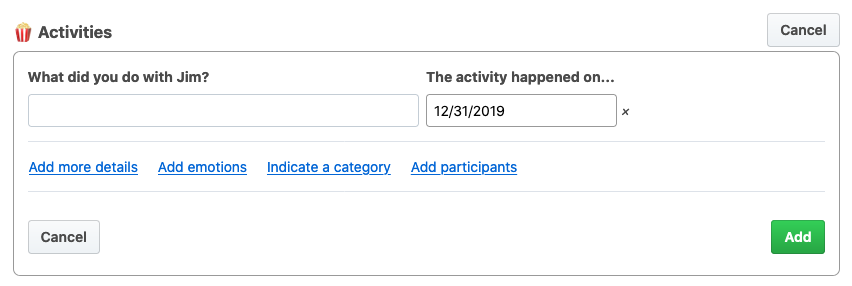
Enhance API settings page
Most of what you can do with Monica can be achieved through the API. It is extremely important for us to let people manipulate their data at will. This is why it was time to enhance the API settings page a little bit, by giving it more love.
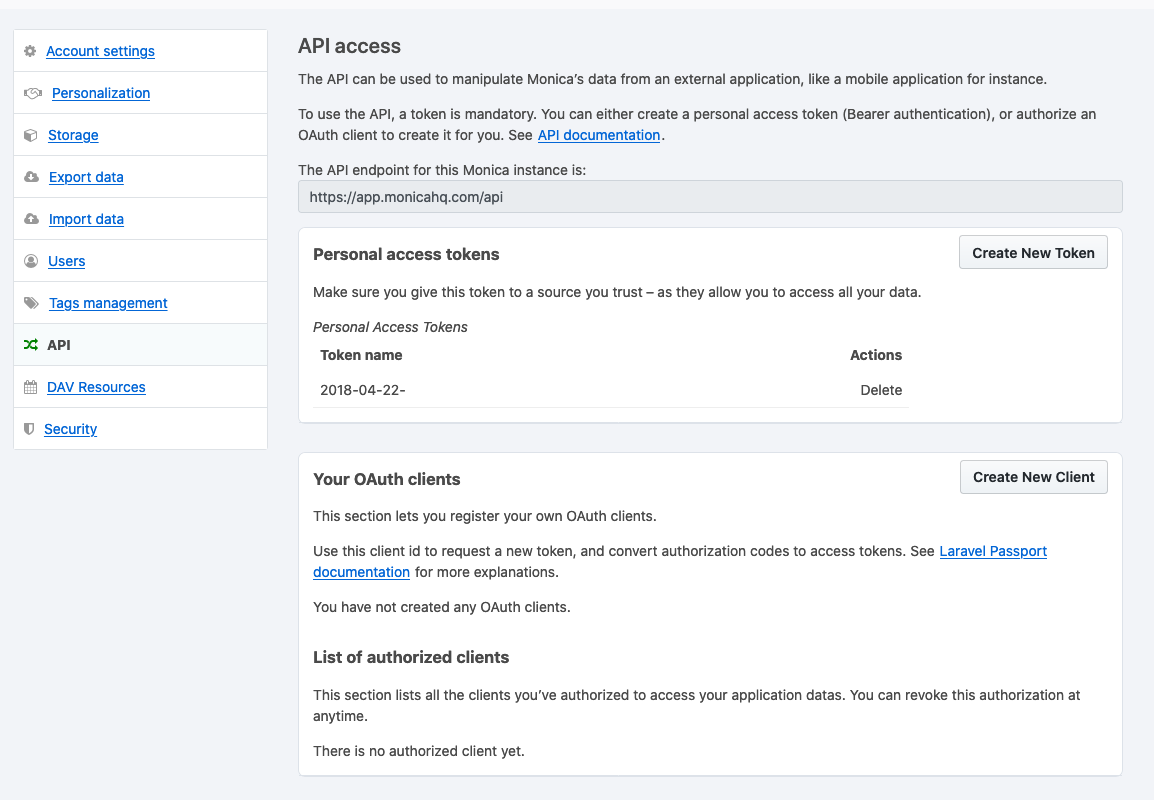
Also, we've added many new API methods to continue our openness to other systems.
Lots of changes under the hood
We've also completely changed how data is stored by adding foreign keys to every table in the database. While this will have no impact on the end-user experience, it’s pretty major for us developers as it will allow us more control and flexibility overall. This was a huge change for us and the pull requests took almost 11 months to get merged.
We've also completely changed how the export process of data is handled and it should work flawlessly from now on (or as they say: 60% of the time, it works every time).
What happened in 2019?
In 2019, we kind of slowed down a little bit in terms of annual releases. Also, the activity on this blog has been nonexistant. However, this didn't affect the number of signups, or the number of downloads, or the love of people on the Internet for this project.
Basically, Monica has never been stronger. We have nearly 5 million downloads of our official docker image. We have tens of thousands of users on our hosted version. Monica keeps popping on Hacker News and our issue tracker on GitHub is as active as ever. Also, we've merged 875 pull requests in 2019.
So why this silence? This is mainly because of me (Regis). I've started Monica almost four years ago now. Having a popular project is a lot of fun, but it also takes a lot of energy and motivation. Especially since Monica is still a side project for both me and Alexis. But this year, Monica was too much for me to handle, and I’m usually the one writing on this blog, or on social media. I had a side-project burnout, if you will. Alexis has taken a lot of work on his shoulders to maintain and evolve the product, but I couldn't work on it as much as before, and I couldn't post any news about the project. I had to do something else, clear my head and come back only when I'd be ready. Now I am, and I’m more than motivated to get back to work and have fun again.
Monica in 2020
Four years ago, Monica was one of the first popular personal CRMs. Fast forward to today, and the competition is now bigger than ever (a dozen, last time I checked). But I do believe that we have an advantage that can not be overtaken by our competitors: we are open source, and we have no charges, no costs or almost, and we are not greedy. Everything we do, we do it for the community first. The more Monica instances there are out there, the happier we are: this means we don't have any control over our users' data.
In 2020:
- We want to continue our work of openness and transparency. That means more ways to export or import data in a standard format.
- We want to provide webhooks so external systems can be aware when data changes in your account (if you so desire, of course).
- I believe Monica is currently the best tool out there to document your personal contacts. You can log anything, really. Now that we have a very strong foundation, I believe it’s time for us to expand on that. It’s time we let you do something more with your contacts, by creating groups (or families), events, opportunities, etc... We will focus on simple concepts that will be gradually added to the platform, that will provide the most flexibility for you.
Monica is a tool for you. Please keep sharing ideas, keep sending me emails about what we should do next. We are here for you.
Also, happy new year 😀
After more than a month of work, I am happy to announce the new version of Monica, with photo upload, improved security, improved phone calls management, weather support, the introduction of emotions and many more enhancements.
Photo upload
You can now upload photos on a contact’s profile page. The number of photos you can store depends on your account’s storage limit, which is 512 Mb on https://monicahq.com (and is configurable per instance). The ability to upload photos unlocks a lot of possibilities in the future.
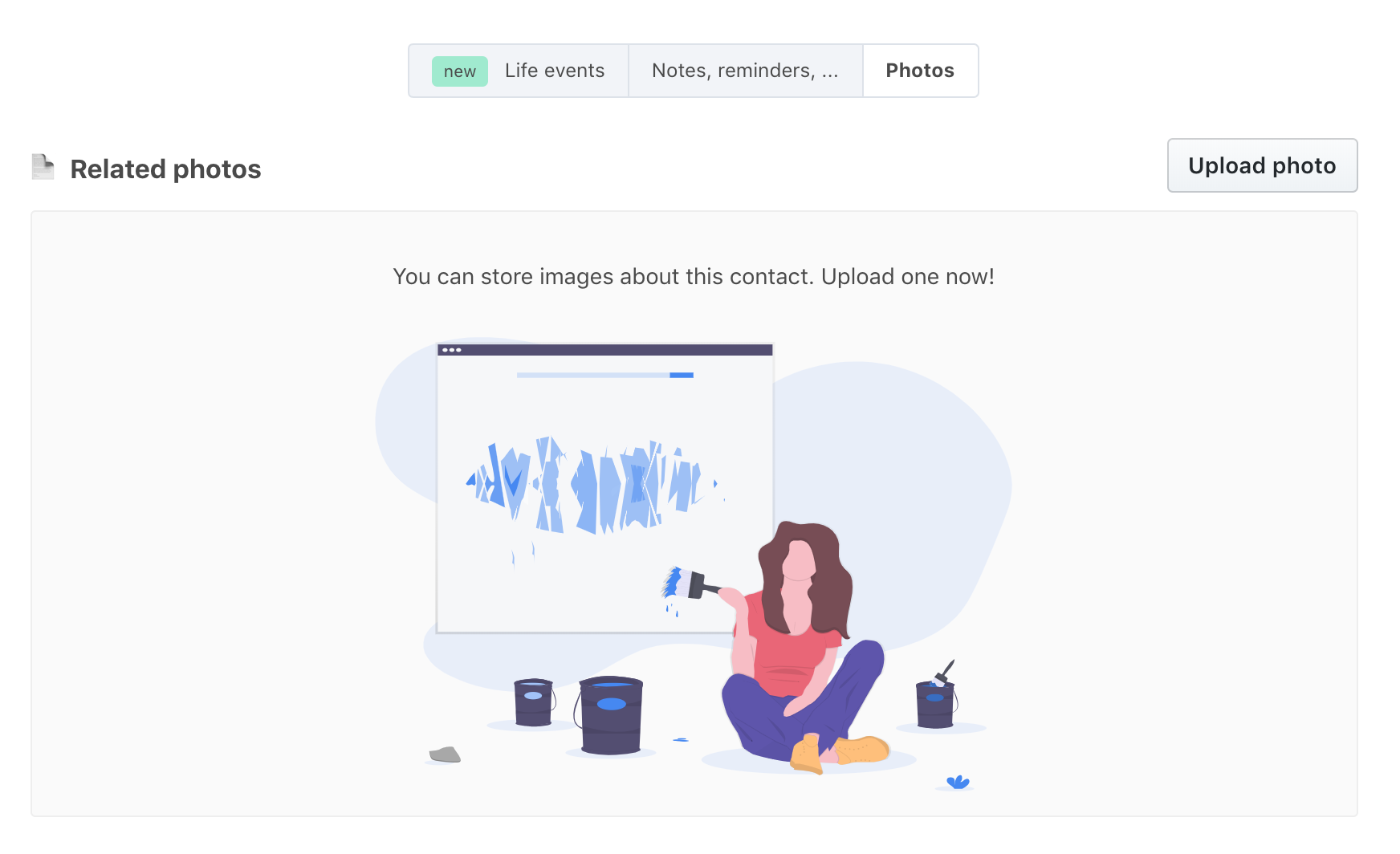
Recovery codes
Security is so important, especially in a tool like Monica which stores many intimate details. Monica already supports two-factor authentication (also known as 2FA) and U2F to help you secure your account. Starting with Monica 2.11, you can now generate recovery codes to unlock your account in the case you’ve lost the ability to login with 2FA. Beware though - as those codes can help access your account, make sure you keep them in a very secure place.
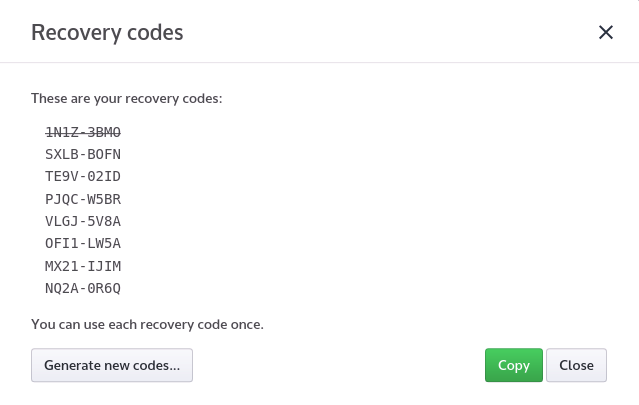
Phone calls
Phone calls have had a lot of love in this release. First of all, we’ve redesigned the flow to record them. Then we’ve (finally) added the possibility to edit a phone call that was made in the past. And as a bonus, you can now indicate who initiated the call.
Emotions
Wouldn’t it be awesome to be able to tell how you felt when something happened, in a very precise manner? Monica 2.11 introduces the notion of emotions, based on the work of Dr. Phillip Shaver. In his work, emotions are sorted into 3 main categories:
- Primary emotions (love, joy, surprise, anger, sadness, and fear),
- Secondary emotions (Love -> Affection, Lust, Longing),
- Tertiary emotions (Love -> Affection -> Adoration, Love, Fondness, Attraction).
We’ve added those concepts in Monica, starting with phone calls. There is a new drop-down menu that lets you choose as many emotions you want, in order to represent very precisely what you felt during a call. We plan to add emotions to other key elements as well, like activities.
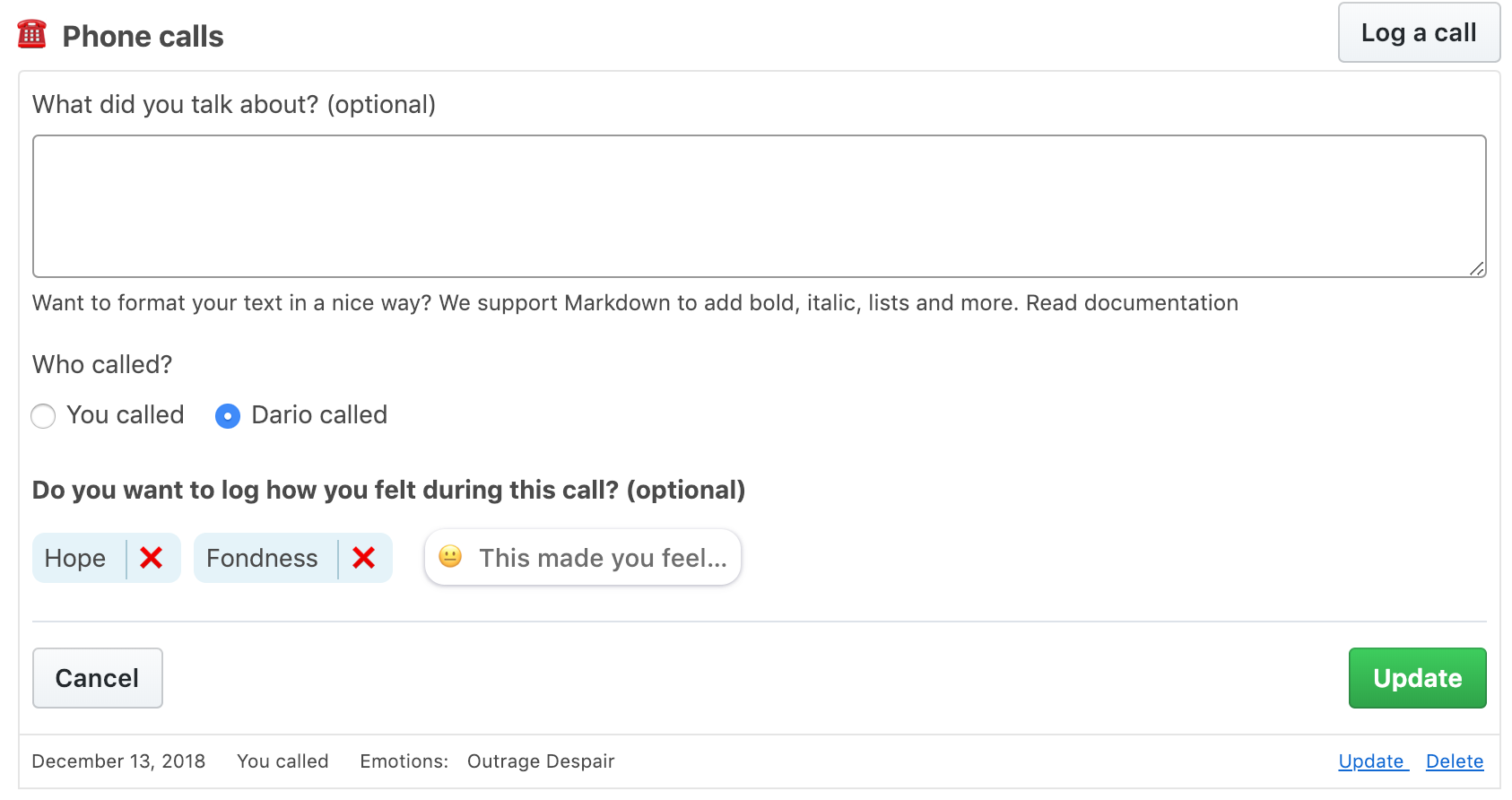
Weather
When you are talking with a friend that lives in another area than you, chances are you will eventually talk about the weather. Monica will help you here, by showing the current weather of the place your friend lives in. This information comes from the first address found on the contact profile page. That also means that if no address is currently set, no weather information will be shown.
Weather data is pulled from Darksky and is refreshed every 6 hours. The only information that is shared with Darksky is the latitude/longitude, and nothing else. For instance owners, Darksky has a free plan that lets you make 1,000 calls per day for free, which should be plenty enough.
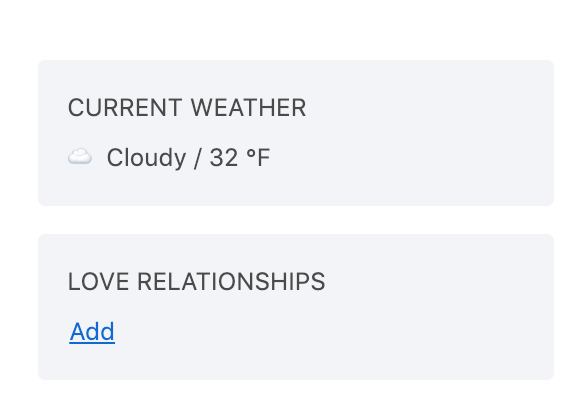
GPS coordinates
Speaking of latitude and longitude, we had to find a mechanism to get those two pieces of information for each address entered in Monica if we wanted to display the weather data. Monica 2.11 now has the ability to automatically geocode any address to find their latitude and longitude coordinates.
When you enter an address, and if the service is configured at your instance level, we’ll automatically try to geocode it - unless you provide the latitude/longitude for a given place yourself.
Geocoding is done by LocationIQ, a great and independent company that offers a very generous free plan of 10,000 calls per day for free. We don’t share any information with LocationIQ other than the address in order to fetch coordinates.
Tasks
On your dashboard, you can now add tasks that are not linked to any contacts.
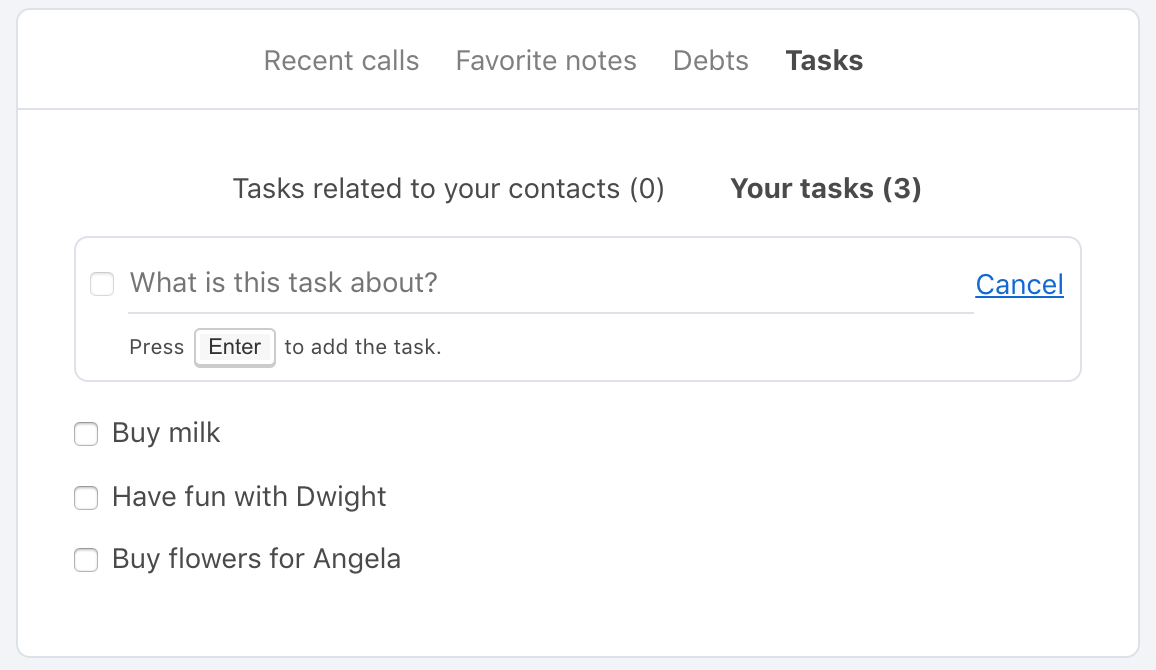
Enhancements
We refactored a lot of how things are written internally. This is to continue our quest of having the most stable platform possible. Also, we've continued to increase the code coverage (i.e. the fact that our code is actually tested automatically). We are now at 66% code coverage for the entire codebase.
We hope you will like 2.11 as much as we do.
I've just removed the mobile applications from both Apple Store and Play Store. The only way to get them is now to build them from the GitHub repository.
While Theo has done an amazing job on the first version of those apps, the development has stopped at the beginning of this summer while the development of Monica, the platform, has moved forward. We are now in a situation where the mobile app is not on par with the platform and worse, we will break things in the API that the mobile app won't support.
I still strongly believe that the growth and adoption of Monica will be through a mobile app.
I would like to promise wonderful things and announce that you'll have a new app in 2 months - but in reality, I don't know how much time it will take. Since Monica is still at the side project stage, it might take 6 months, or 2 years. But one day we'll have a great mobile application, as good as the web version (if not better).
Thanks for your patience.
Version 2.10.0 is our 51th release. It contains a significant amount of new features and is the result of a month of work from 10 developers, not counting all the translators who are nice enough to translate Monica in 11 languages. Here are some highlights of the changes.
Tag autocompletion
Tags are a great way to categorize people. With 2.10.0, finally, we support tag autocompletion. Go to a contact and edit the tags in the header - as you type, a menu will appear showing your tags. A small change for Monica - a big help for users.
A technical note: this feature has been entirely developed with VueJS, without other dependancy. We are moving away from JQuery and over the course of the next months, we'll sunset JQuery entirely.
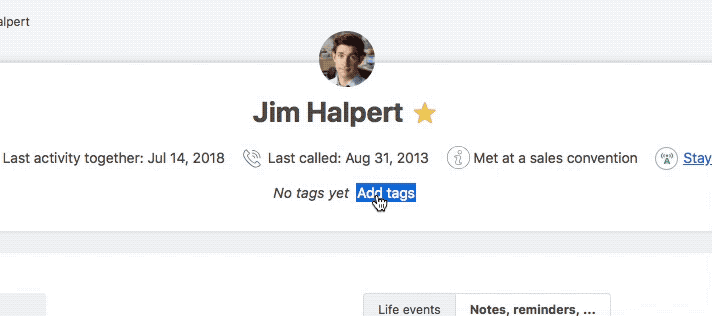
New header
Speaking of the header, as we were changing how tags work, we've taken this opportunity to redesign the header of a contact profile. This will let us add much more useful information in the future. It's also easier to read.

Documents
You can now attach documents to a contact. There is a configurable limit per instance on how much storage an account can use. On our hosted version, the limit is 512Mb per paid account (storage is cheap - but not when you host ten of thousands of accounts).
There is also a new tab in your Settings page called Storage that shows your current account usage and your account limit.
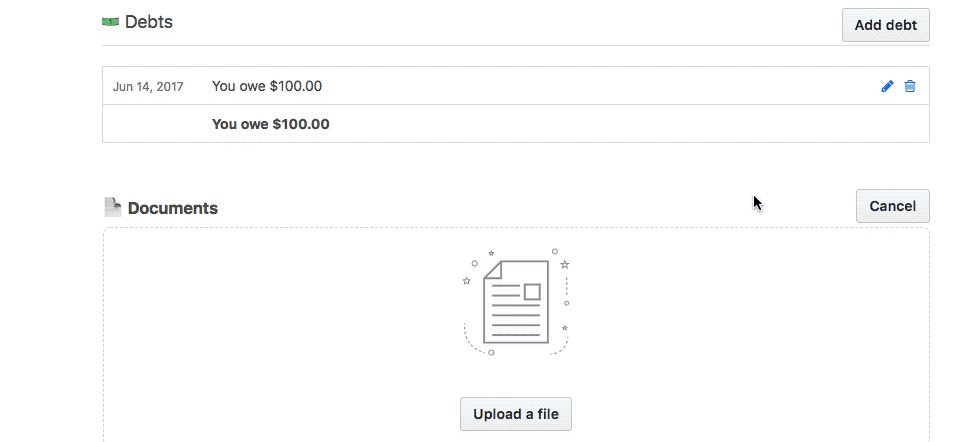
Archive a contact
Sometimes you want to add a contact but not have him appear on the contact list. Archiving a contact lets you do that. You can access this feature from the bottom left of the contact profile.
Other improvements
- We've fixed a lot of bugs.
- We've improved how we support S3 to store assets (images, documents,...)
- We've dramatically increased our test coverage. 6 months ago we were at 25% test coverage. With our continuous effort of increasing them, we are now at 65%. This gives us much more confidence that we don't break things as we move forward.
- We now automatically set the currency and the timezone for new users, based on their location.
- We've rewritten how we import/export vCard.
- We also now parse FN properties correctly when we import vCards.
Have fun with version 2.10!
I don't like Facebook. It's not a secret. But despite their general evilness, they have some nice features here and there. One of them is the ability to track life events that happened to you. Such as indicating when you had a surgery or when you did renovations in your home. While I don't understand why you would give this information to Facebook, it makes sense to record this type of information about people you care about. So this is what we just shipped.
Life events is now a new tab in the Profile page of a contact.
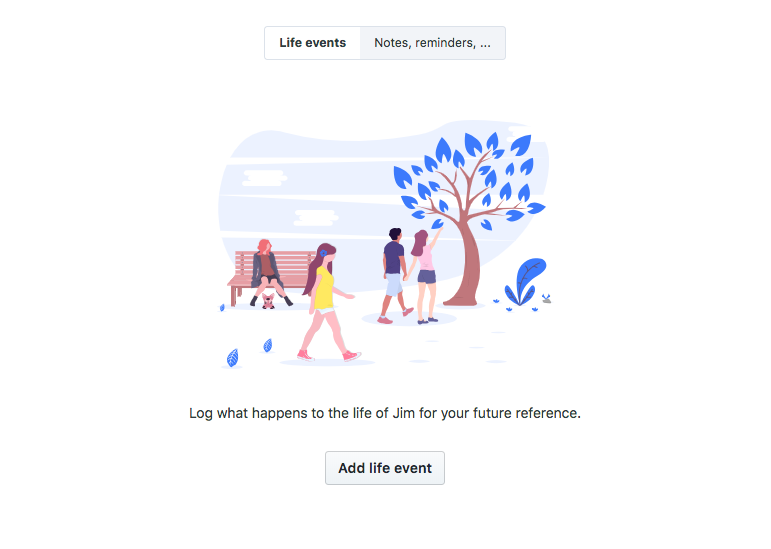
You have access to 45+ life events that you can document. You can also set a reminder for each one of these events.
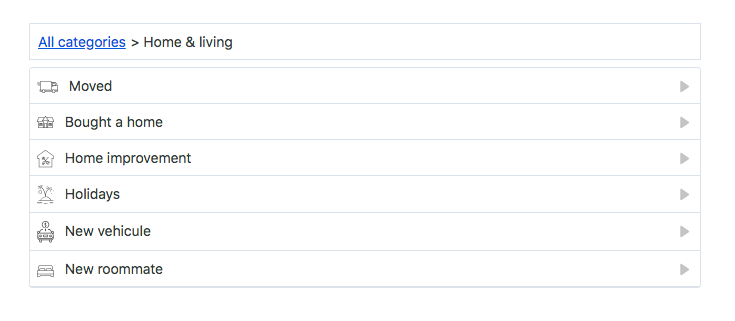
Note that you can add an event without knowing the month or the day it happened.
Once a life event is added, it will appear on a timeline that will be improved in an upcoming release.
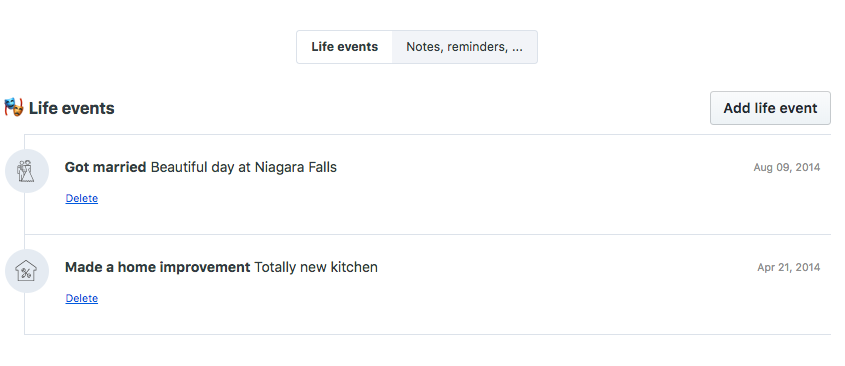
I hope you will like this feature and have fun with it.
At its core, Monica is about logging information about the people you care about. While you can log a lot of stuff already, you didn't have a way to easily record what you said to someone at any point of time.
With our latest update, you can now log a conversation that you have had with someone on social media, by SMS or using Telegram, for instance. The interface we've chosen for this mimics the user interface used by popular chatting tools.
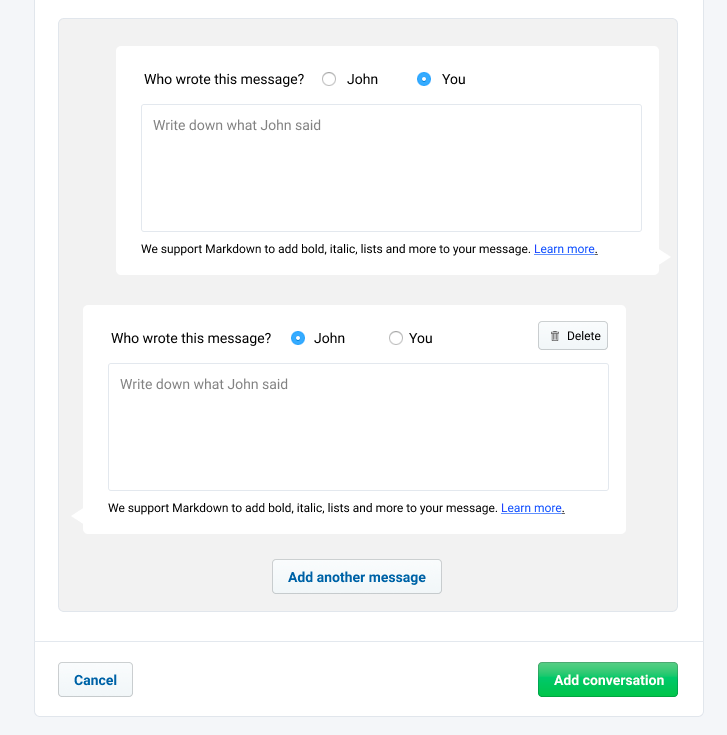
When you log a conversation, you can indicate the mean of communication you've had this conversation with. This list of means is pulled from the contact field types defined in your Settings page.
We hope that you will make good use of this new feature.
In the past two months we've shipped a bunch of useful new features and we've been too silent about it.
Here are some of the most important changes:
- Remove automatic birthday reminder creation when editing a contact: this was something that irritated a lot of users. From now on, when you add/edit a contact and specify a birthdate, we don't automatically create a reminder for this event.
- Debts across all your contacts are now showed on the dashboard.
- We've added GDPR compliance. This is a new European law that forces us to confirm your email address on signup. I wanted to avoid it, but we don't have the choice legally.
- We've improved the import of contacts through CSV. The process should work better now.
- We've added a new kind of relationship between contact: ex-wife/husband.
- There is a new filter in the contact list that lets you see contacts who are not associated with a tag.
- We finally support nicknames for your contacts! You can also choose how you want to display the names in your account.
- Add Yubikey support - this is another security feature for those who want an extra layer of protection.
On another note, it's been more than a year now that Monica has been launched on Hacker News. The growth has been pretty incredible, especially regarding the community on GitHub. We have now more than 110 contributors who help build Monica, which is awesome. That being said, there is a drawback to this: we've been shipping new features a lot, and because of this pace, we haven't been careful enough in the last months. Monica is not as stable as it should be. Nothing dramatic or critical, but the last two releases have seen some stupid bugs that we could have prevented, and we will put measures in place to increase the chances that this doesn't happen again. It's especially important to ship bug free releases as Monica is still a side project, and the worst that can happen is noticing something is very wrong on the platform while you are at work, and having to wait to find the time to actually fix and deploy to production (usually when we come back home and have to deal with kids etc...). On a daily basis, trust me, it's the kind of worries you don't want to have.
All this to say that we will try to focus on quality in general.
Please continue to send your feedback via email or through an issue on GitHub. We read every message and your opinion is important to us (really).
I receive emails asking for a mobile application almost every single day since the public launch in June 2017.
I understand why. A mobile app for Monica makes so much sense. You want to have the information immediately available wherever you are, at the right moment. Not when you are at home in front of your desktop.
We started working on the mobile application 6 months ago. It’s a long time. However, I don't think most people realize the work that needs to be done to ship a mobile application. Especially when 99.9% of the code is made by one person (the awesome @mokto). Who has a daily job. Who is not paid to work on it.
In those months, we've put a lot of efforts to create all the things the mobile application would need. The API has changed a lot to allow some features. We've stabilized the backend to make sure it will work flawlessly. We've also spent a lot of time setting up everything the right way on the mobile app repository on GitHub, that will allow us to move faster in the future (here we are talking about a great CI, unit tests, auto publishing in the stores,...).
And six months later we are proud to announce that the first version of the mobile application is available on iOS and Android.

There is one caveat though: this first version is read-only. That means you can't add or edit something. We want to have a great application, but we want to move slowly and make sure it's working well. As soon as we are confident this version works for everyone, we'll add features that will let you completely manipulate your data as you want (hint: we’ve already started working on a new version).
Apart from this, this mobile app has everything you come to expect from us:
- A simple and friendly user interface.
- You can connect to our hosted version of Monica, or login to your own instance.
- The code is open source. You can read the code, submit issues, contribute to the code. Everything we do is open and transparent, and we believe that only collaboration can lead to the best product.
- Open source means you can build and run the mobile application without having to go through the official Apple and Google stores - which is kind of amazing, in my opinion.
- We don't display ads, we don't resell your data.
- We don't have any tracking whatsoever in our code.
- The app is free. No strings attached.
How can you help?
We need people who want to test the application and tell us if there are bugs, basically. Also, we'd like your opinion on what we should build next, or how we could make the app better (in terms of user experience or in terms of layout).
What's next?
In the coming days we'll improve the documentation on the official GitHub repository, in order to make it super easy for developers who want to help to join the project.
In the coming months we'll add the possibility to modify your data within the mobile application. The end goal is that everything you can do on the web, you can do on mobile (with the exception of exporting your data, because how would you store a file on iOS for instance...). This is why we are now building features in the API first, then in the UI (both web and mobile).
As a conclusion, I'd say that I'm very proud of what we've accomplished so far, and even prouder by the community who help us every single day. Your feedback and your help make Monica possible.
















